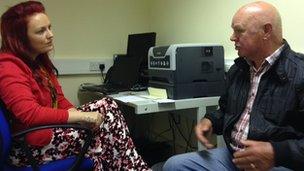"Advice on prescription" project to help beat depression
- Published

The NHS in Liverpool is trying a different approach to help patients who are distressed or on the verge of depression.
Every GP in the city is being given access to a Citizens Advice worker, who can offer support with housing and financial problems.
I went to Norris Green, a part of the city which has a lot of social housing and people on benefits.
William Heraty, 73, has come to his local GP surgery - not for a medical appointment but to get some practical help, as part of the scheme.
He has experienced problems with money and his house since his wife and son died recently.
Advice worker Kayleigh Williams has some good news for Mr Heraty.

William Heraty seeing Kayleigh Williams at a GP surgery for "advice on prescription"
She told him: "I'm writing to the bank to pass them your wife's death certificate, and tell them to accumulate the money you shouldn't have been paying since she died.
"I calculated it at about £860."
Mr Heraty is due back money he had mistakenly been paying on his wife's behalf since she died.
He appears briefly overwhelmed that the cash will help with some much-needed repairs to his house, and perhaps allow a holiday.
He said: "I'd like to go somewhere and take my fishing rod with me. It's been quite a few years since I had a holiday."
Counselling has helped Mr Heraty's grief - but more than anything, he has needed this practical support.
His wife had always handled the household finances, and Parkinson's Disease means he often feels tired.
He added: "I've been worrying about taking ten pounds out for petrol. I've got to learn how to cope with all of this."
Transformation
It is a moving encounter - especially when the Citizens Advice worker, Kayleigh Williams, tells Mr Heraty he now seems a "changed man".
She helps steer a transformation in people whose lives have perhaps lost some control, as part of the "Advice on Prescription" project run by Liverpool Clinical Commissioning Group.
One client was a man referred by his GP who had not opened his post for a year and was living on handouts.
Kayleigh Williams said: "I wrote a list of things he needed to do. He was quite unresponsive at first.
"But by the third and fourth interviews, he was coming in with a bag of his letters labelled up with post-it notes. He knew who he needed to ring.
"He was like a different person. I think the organisation had rubbed off on him."
Professor Chris Dowrick, a GP as well as an academic at Liverpool University, is the author of a book called "Beyond Depression", which has proved influential in the surgery project.
He agrees it is a useful trial because it helps people beyond the formal medical boundaries and time pressures involved in most GP appointments.
He told me: "Most people's mental health problems have got much more to do with income, employment and their environment.
"This is about de-stigmatising people, and helping them realise they're not to blame for everything."
The work in Liverpool's GP surgeries has been planned by NHS commissioners there with a specific anti-poverty drive.
Similar advice schemes are underway in Plymouth and Bridgend - and they are also being evaluated by researchers.
A pilot has begun in Scotland too, with link workers in low-income communities.
The results may well confirm that patients who are sad or distressed do not always need medical treatment.